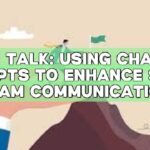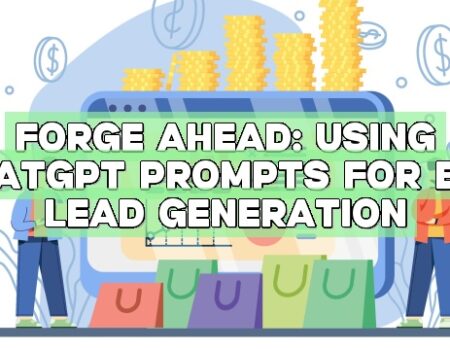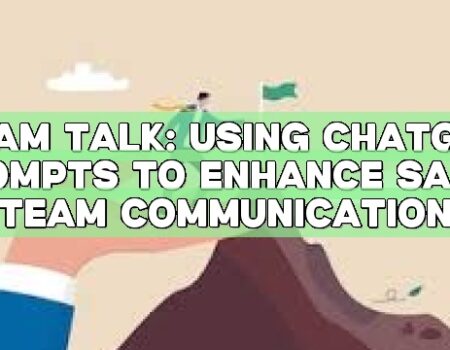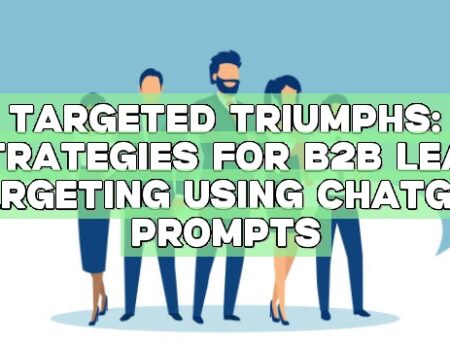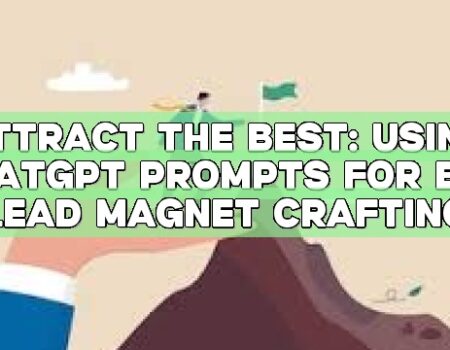ChatGPT, an advanced Natural Language Generation tool developed by OpenAI, has gained significant popularity in the marketing industry. Marketers are exploring various ways to utilize ChatGPT for B2B lead targeting and improve their marketing performance. In this article, we will explore practical strategies and examples of how ChatGPT can be used effectively in B2B lead targeting.
Prompt Engineering: Enhancing ChatGPT’s Output
Before delving into the specific applications of ChatGPT in B2B lead targeting, it is essential to understand the concept of “Prompt Engineering.” Prompting refers to the technique of providing specific instructions and context to ChatGPT for generating desired outputs. While ChatGPT is capable of generating text without specific prompts, the quality of its output can be improved significantly by employing appropriate prompting techniques.
Researching Target Industries and Buyer Personas
One of the key applications of ChatGPT in B2B lead targeting is conducting research on target industries and buyer personas. By leveraging ChatGPT’s extensive knowledge base, marketers can gather valuable insights and create comprehensive profiles. To utilize ChatGPT for this purpose, marketers should define their research objectives and create targeted prompts that guide the AI model. By inputting these prompts into ChatGPT, marketers can generate industry insights and buyer persona profiles that provide a deeper understanding of their target audience.
Building Personal Brands on Social Media
ChatGPT can also be instrumental in building personal brands on social media platforms. By generating engaging and relevant content, ChatGPT can help marketers create a consistent brand image and cater to the preferences of their audience. Marketers can use ChatGPT to create high-quality content, maintain a consistent tone and style across social media channels, gain insights into the audience’s preferences, and plan their content strategy effectively.
Writing Messages for Cold Outreach
Cold outreach is an integral part of B2B sales, and ChatGPT can assist in creating effective outreach messages. By understanding the context and generating personalized messages, ChatGPT can help sales teams capture the attention of their prospects. The AI model ensures that the messages maintain a consistent tone, style, and messaging, which helps build a professional image and reinforces the brand identity.
Generating Lead Qualification Questions
ChatGPT can generate lead-qualifying questions that assess the fit between a prospect and the products or services offered. By identifying key criteria and creating targeted prompts, marketers can utilize ChatGPT to generate relevant questions. These questions help gather information about the prospect’s industry, company size, pain points, and decision-making process. By using these questions, marketers can effectively qualify leads and tailor their approach accordingly.
Using ChatGPT for Cold Emails
Cold emails play a crucial role in B2B sales outreach, and ChatGPT can significantly enhance the creation of personalized and engaging emails. By understanding the target audience, gathering relevant information, and leveraging ChatGPT’s content generation capabilities, marketers can craft tailored cold emails that resonate with their prospects. It is important to inject personalization, focus on the value proposition, provide a clear call-to-action, and end the email with a polite closing. Marketers should continuously test, analyze, and iterate on their emails to improve their performance.
Conclusion
ChatGPT, with its powerful language generation capabilities, offers numerous opportunities for B2B lead targeting in the marketing industry. By employing Prompt Engineering techniques and leveraging ChatGPT’s capabilities, marketers can enhance their content marketing, social media marketing, email marketing, and cold outreach efforts. The key lies in understanding how to prompt ChatGPT effectively and refining the generated content to align with brand voice and specific target audience context. As ChatGPT continues to advance, marketers can incorporate this AI tool into their strategies to achieve targeted triumphs in B2B lead targeting.
Key Takeaways
- ChatGPT can be used to enhance B2B lead targeting strategies across various marketing channels.
- Prompt engineering plays an integral role in improving ChatGPT’s output and generating desired results.
- Using ChatGPT for research, social media marketing, cold outreach, and email marketing can help marketers create targeted content and engage with their prospects effectively.
- Marketers should continuously test, analyze, and refine their ChatGPT-generated content to align with their brand voice and specific target audience context.
Prompt Engineering: Enhancing ChatGPT’s Output
Before delving into the specific applications of ChatGPT in B2B lead targeting, it is essential to understand the concept of “Prompt Engineering.” Prompting refers to the technique of providing specific instructions and context to ChatGPT for generating desired outputs. While ChatGPT is capable of generating text without specific prompts, the quality of its output can be improved significantly by employing appropriate prompting techniques.
Researching Target Industries and Buyer Personas
One of the key applications of ChatGPT in B2B lead targeting is conducting research on target industries and buyer personas. By leveraging ChatGPT’s extensive knowledge base, marketers can gather valuable insights and create comprehensive profiles. To utilize ChatGPT for this purpose, marketers should define their research objectives and create targeted prompts that guide the AI model. By inputting these prompts into ChatGPT, marketers can generate industry insights and buyer persona profiles that provide a deeper understanding of their target audience.
| Benefits of ChatGPT in Researching Target Industries and Buyer Personas |
|---|
| Efficient: ChatGPT can quickly generate insights and data points related to target industries or buyer personas, streamlining the research process and reducing time and resource consumption. |
| Comprehensive: ChatGPT’s extensive knowledge base enables comprehensive research on different aspects of target industries and buyer personas. |
| Personalized: Marketers can input specific prompts to generate insights that cater to their organization’s unique needs and target audience. |
By utilizing ChatGPT for researching target industries and buyer personas, marketers can identify patterns and trends in their target audience’s behavior, preferences, and pain points. They can also create detailed buyer personas that align with their products or services and develop targeted promotional strategies to appeal to them more effectively.
Building Personal Brands on Social Media
ChatGPT can also be instrumental in building personal brands on social media platforms. By generating engaging and relevant content, ChatGPT can help marketers create a consistent brand image and cater to the preferences of their audience.
Marketers can use ChatGPT to create high-quality content that resonates with their target audience. The AI model can maintain a consistent tone and style across social media channels, gaining insights into the audience’s preferences and planning content strategy effectively. By customizing the prompts to capture the style and tone of the brand, ChatGPT can generate content themes and ideas that align with the brand’s messaging.
Moreover, ChatGPT can help marketers understand the audience’s preferences and behaviors on social media. By analyzing the audience’s engagements, marketers can gain insights into the type of content that resonates with their audience and fine-tune the content generation process. ChatGPT can also provide personalized content recommendations that cater to individual preferences, increasing engagement and boosting the brand’s social media presence.
To summarize, ChatGPT can be an integral part of building personal brands on social media platforms. By customizing prompts to capture the brand’s voice and messaging, marketers can leverage ChatGPT to generate engaging and relevant content, gain insights into the audience’s behavior, and plan their content strategy effectively.
Writing Messages for Cold Outreach
Cold outreach is an integral part of B2B sales, and ChatGPT can assist in creating effective outreach messages. By understanding the context and generating personalized messages, ChatGPT can help sales teams capture the attention of their prospects. The AI model ensures that the messages maintain a consistent tone, style, and messaging, which helps build a professional image and reinforces the brand identity.
Marketers can input the prospect’s information and relevant criteria into ChatGPT and generate personalized outreach messages without spending an enormous amount of time. The AI tool can learn from previous conversations and interactions, enabling it to generate more targeted and engaging messages over time.
When crafting cold outreach messages with ChatGPT, it is crucial to keep the message concise, personalized, and straightforward. The message should clearly state the benefits of the product or service and how it addresses the prospect’s specific pain points.
Marketers should also incorporate a clear call-to-action in the messaging, which offers the prospect a next step that they can take to learn more about the product or service. The call-to-action should be specific and avoid vague language that leaves the prospect unsure of the intended next step.
Lastly, marketers should take the time to review the generated messages and refine them where necessary. By refining the messages, marketers can ensure that the messaging aligns with brand voice and specific target audience context.
Generating Lead Qualification Questions
ChatGPT can generate lead-qualifying questions that assess the fit between a prospect and the products or services offered. By identifying key criteria and creating targeted prompts, marketers can utilize ChatGPT to generate relevant questions. These questions help gather information about the prospect’s industry, company size, pain points, and decision-making process. By using these questions, marketers can effectively qualify leads and tailor their approach accordingly.
One of the most significant benefits of using ChatGPT to generate lead-qualifying questions is the ability to improve the accuracy and efficiency of lead qualification. The AI model can generate questions that capture essential information about the prospect, enabling marketers to identify high-potential leads and allocate resources accordingly.
Moreover, ChatGPT’s ability to generate questions automatically saves marketers significant time and resources. With this approach, they can focus on other critical aspects of their marketing campaigns, such as content creation, social media management, and analytics.
However, while ChatGPT can generate sophisticated questions, marketers must also review them to ensure they align with their brand voice, target audience context, and campaign objectives. By refining the questions and prompts, marketers can ensure that the generated content is in line with their overall marketing strategy.
Best Practices for Generating Lead Qualification Questions:
- Define the key criteria for lead qualification: Marketers should identify the essential attributes and characteristics that qualify a lead. This could include demographics, company size, industry, pain points, budget, decision-making process, and other relevant factors.
- Create targeted prompts: The prompts should guide ChatGPT to generate questions that align with the lead qualification criteria. Marketers should use clear language, specific examples, and provide context to ensure that the prompts are effective.
- Refine the questions: After generating the questions, marketers should review them to ensure they align with their brand voice, target audience context, and campaign objectives. They should refine the questions to improve accuracy, relevance, and effectiveness.
By following these best practices, marketers can leverage ChatGPT’s capabilities to generate relevant lead-qualifying questions and streamline their lead qualification process.
Using ChatGPT for Cold Emails
Cold emails play a crucial role in B2B sales outreach, and ChatGPT can significantly enhance the creation of personalized and engaging emails. By understanding the target audience, gathering relevant information, and leveraging ChatGPT’s content generation capabilities, marketers can craft tailored cold emails that resonate with their prospects.
It is essential to start by defining the objectives of the email and creating targeted prompts that align with the message’s purpose. Marketers can utilize ChatGPT to develop personalized and relevant content that captures the recipient’s attention and provides value. By analyzing the prospect’s interests, preferences, and needs, marketers can tailor their approach and create compelling emails that encourage action.
When crafting cold emails using ChatGPT, it is crucial to inject personalization to make the message feel less generic. ChatGPT can help create email templates that address the recipient by name and contain personalized information that makes them feel seen and valued. Another critical element to include is the value proposition. The email should clearly communicate what the marketer has to offer and how it will solve the prospect’s problem.
It is also essential to provide a clear call-to-action (CTA) that guides the prospect towards the desired action. ChatGPT can help create effective CTAs that persuade recipients to engage with the brand, whether it’s to schedule a demo, request a quote, or download a resource. The email should end with a polite closing that reinforces the brand image and encourages a positive response.
Marketers should continuously test, analyze, and iterate on their cold emails to improve their performance. By reviewing the metrics, marketers can identify areas of improvement and refine their approach to achieve better results. With ChatGPT’s capabilities, marketers can create engaging and personalized cold emails that resonate with their prospects and drive conversions.
Conclusion
ChatGPT, with its powerful language generation capabilities, offers numerous opportunities for B2B lead targeting in the marketing industry. By employing Prompt Engineering techniques and leveraging ChatGPT’s capabilities, marketers can enhance their content marketing, social media marketing, email marketing, and cold outreach efforts. The key lies in understanding how to prompt ChatGPT effectively and refining the generated content to align with brand voice and specific target audience context. As ChatGPT continues to advance, marketers can incorporate this AI tool into their strategies to achieve targeted triumphs in B2B lead targeting.
References
Here are the references used in this article:
- OpenAI. (2021). GPT-3. Retrieved from https://openai.com/blog/gpt-3-apps/
- Sprout Social. (2021). Social Media Trends Report. Retrieved from https://sproutsocial.com/insights/social-media-trends/
- HubSpot. (2021). 19 Sales Email Templates to Reach Out to Prospects. Retrieved from https://blog.hubspot.com/sales/sales-email-templates
- Kissmetrics. (2015). The Science of Lead Qualification. Retrieved from https://blog.kissmetrics.com/the-science-of-lead-qualification/
- Bizible. (2019). B2B Sales Statistics: Data-Driven Insights for Sales Teams. Retrieved from https://www.bizible.com/blog/b2b-sales-statistics-data-driven-insights-for-sales-teams
FAQ
Q: What is ChatGPT?
A: ChatGPT is an advanced Natural Language Generation tool developed by OpenAI.
Q: How can ChatGPT be used in B2B lead targeting?
A: ChatGPT can be used in various ways such as conducting research on target industries and buyer personas, building personal brands on social media, writing messages for cold outreach, generating lead qualification questions, and crafting cold emails.
Q: What is prompt engineering?
A: Prompt engineering refers to the technique of providing specific instructions and context to ChatGPT to improve the quality of its output.
Q: How can ChatGPT help in researching target industries and buyer personas?
A: By leveraging ChatGPT’s extensive knowledge base, marketers can gather valuable insights and create comprehensive profiles of their target audience.
Q: How can ChatGPT assist in building personal brands on social media?
A: ChatGPT can generate engaging and relevant content, helping marketers create a consistent brand image and cater to the preferences of their audience.
Q: How can ChatGPT be used for writing messages for cold outreach?
A: ChatGPT can generate personalized messages that capture the attention of prospects, maintaining a consistent tone, style, and messaging.
Q: How can ChatGPT generate lead qualification questions?
A: By using targeted prompts, marketers can leverage ChatGPT to generate relevant questions that assess the fit between a prospect and the products or services offered.
Q: How can ChatGPT enhance the creation of cold emails?
A: ChatGPT can help marketers gather relevant information and craft tailored cold emails that resonate with their prospects, focusing on personalization, value proposition, and clear call-to-action.
Q: What are the benefits of using ChatGPT in B2B lead targeting?
A: ChatGPT offers marketers opportunities to enhance their content marketing, social media marketing, email marketing, and cold outreach efforts, leading to targeted triumphs in B2B lead targeting.
Q: What is the key to effectively using ChatGPT in B2B lead targeting?
A: The key lies in understanding how to prompt ChatGPT effectively and refining the generated content to align with brand voice and specific target audience context.





